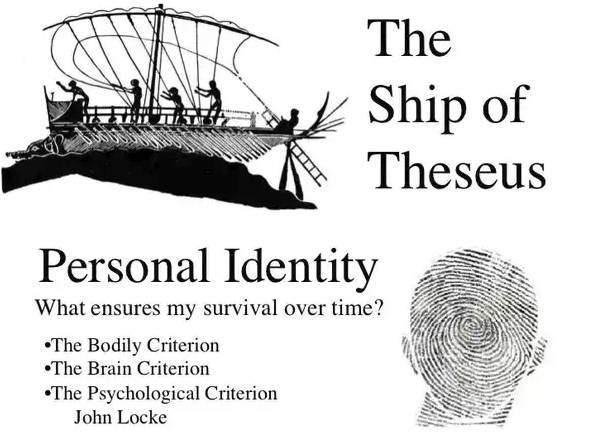The Ship of Theseus was rebuilt over the centuries as wood rotted and broke, so at what point did it stop being the original, and when did it become something else?

Within the span of seven years, every cell of your body will die and be replaced—you literally are not the same person you once were. If this is the case, where lies our identity and psyche? Should we be held accountable for the actions of another body, or another mind? These questions, and many more, are contemplated in The Outer Limits of Reason (The MIT Press, 2013).
Noson S. Yanofsky considers what cannot be predicted, described, or known, and what will never be understood. In this excerpt from “Philosophical Conundrums,” Yanofsky references the Ship of Theseus before questioning the existence of personal identity.
In ancient Greece, there was a legendary king named Theseus who supposedly founded the city of Athens. Since he fought many naval battles, the people of Athens dedicated a memorial in his honor by preserving his ship in the port. This “ship of Theseus” stayed there for hundreds of years. As time went on, some of the wooden planks of Theseus’ ship started rotting away. To keep the ship nice and complete, the rotting planks were replaced with new planks made of the same material.
Here is the key question: If you replace one of the planks, is it still the same ship of Theseus? This question about a mythical ship is the poster child for one of the most interesting problems in all of philosophy, namely the problem of identity. What is a physical object? How do things stay the same even after they change? At what point does an object become different? When we talk about a certain object and say that “it changed,” what exactly is “it”?
What happens if you change two of the ship’s planks? Would that make it somehow less of the original ship than after one plank is changed? What if the ship consists of a hundred planks and forty-nine of the planks are changed? How about fifty-one changed planks? What about changing ninety-nine of the hundred planks? Is the single plank at the bottom of the ship enough to maintain the original lofty status of the ship? And what if all of the planks are changed? If the change is gradual, does the ship still maintain its status as the ship of Theseus? How gradual must the change be?
We are not answering these questions simply because there are no objective correct answers. Some maintain that changing one plank changes the ship and makes it no longer the ship of Theseus. Others claim that as long as there is at least one plank from the original, it is still the original. There are also those who maintain that the changed ship is always the same as the original ship because it has the form of the original. None of these different positions are wrong. However, there is no reason to say that any of them are correct either.
Let us continue asking more questions about our beleaguered boat. What happens if we switch the old wooden planks for more modern plastic planks? Then, as we change more and more of the planks, the ship will be made of a different material than the original. What happens if the people who replace the planks make mistakes in putting in the new planks and the ship has a slightly different form?
Another question: Does it matter who is making all these changes to the ship—that is, whether one group of workers does it or another? If the ship is to be preserved for hundreds of years, then surely many different people will have to be making the changes. What if we make so many changes to the boat that it can no longer float out to sea? Can we still call it the ship of mighty Theseus if it cannot perform the same function as the original?

Theseus ship of Europe - A Philosophical Conondrum
What if we replace planks with people? As time kills the people, they are at first, slowly replaced by ethnic Europeans, but then, at a faster and faster phase ´the planks´ are replaced with different shapes, colours and breeds until ALL the original planks/people of Europe have been replaced. At this point the Theseus ship of Europe will no longer be the same, and will cease to exsist as the original.
The ship of Theseus has just sunk and only ONE filled up lifeboat remains. If we take more onboard, we will ALL perish. The sea around are filled with drowning people, desperately, and in panick, clamouring to climb onboard. YOU are the armed officer in charge. WHAT IS YOUR PAINFUL DECISION?
WHO and WHAT is behind it all ? : >
The bottom line is for the people to regain their original, moral principles, which have intentionally been watered out over the past generations by our press, TV, and other media owned by the Illuminati/Bilderberger Group, corrupting our morals by making misbehavior acceptable to our society. Only in this way shall we conquer this oncoming wave of evil.
Comments
Administrator
HUMAN SYNTHESIS
All articles contained in Human-Synthesis are freely available and collected from the Internet. The interpretation of the contents is left to the readers and do not necessarily represent the views of the Administrator.
Disclaimer: The contents of this article are of sole responsibility of the author(s). Human-Synthesis will not be responsible for any inaccurate or incorrect statement in this article. Human-Synthesis grants permission to cross-post original Human-Synthesis articles on community internet sites as long as the text & title are not modified. The source and the author's copyright must be displayed. For publication of Human-Synthesis articles in print or other forms including commercial internet sites.
Human-Synthesis contains copyrighted material the use of which has not always been specifically authorized by the copyright owner. We are making such material available to our readers under the provisions of "fair use" in an effort to advance a better understanding of political, economic and social issues. The material on this site is distributed without profit to those who have expressed a prior interest in receiving it for research and educational purposes. If you wish to use copyrighted material for purposes other than "fair use" you must request permission from the copyright owner.
TILBAKE TIL HOVEDMENYEN - BACK TO THE MAIN MENU